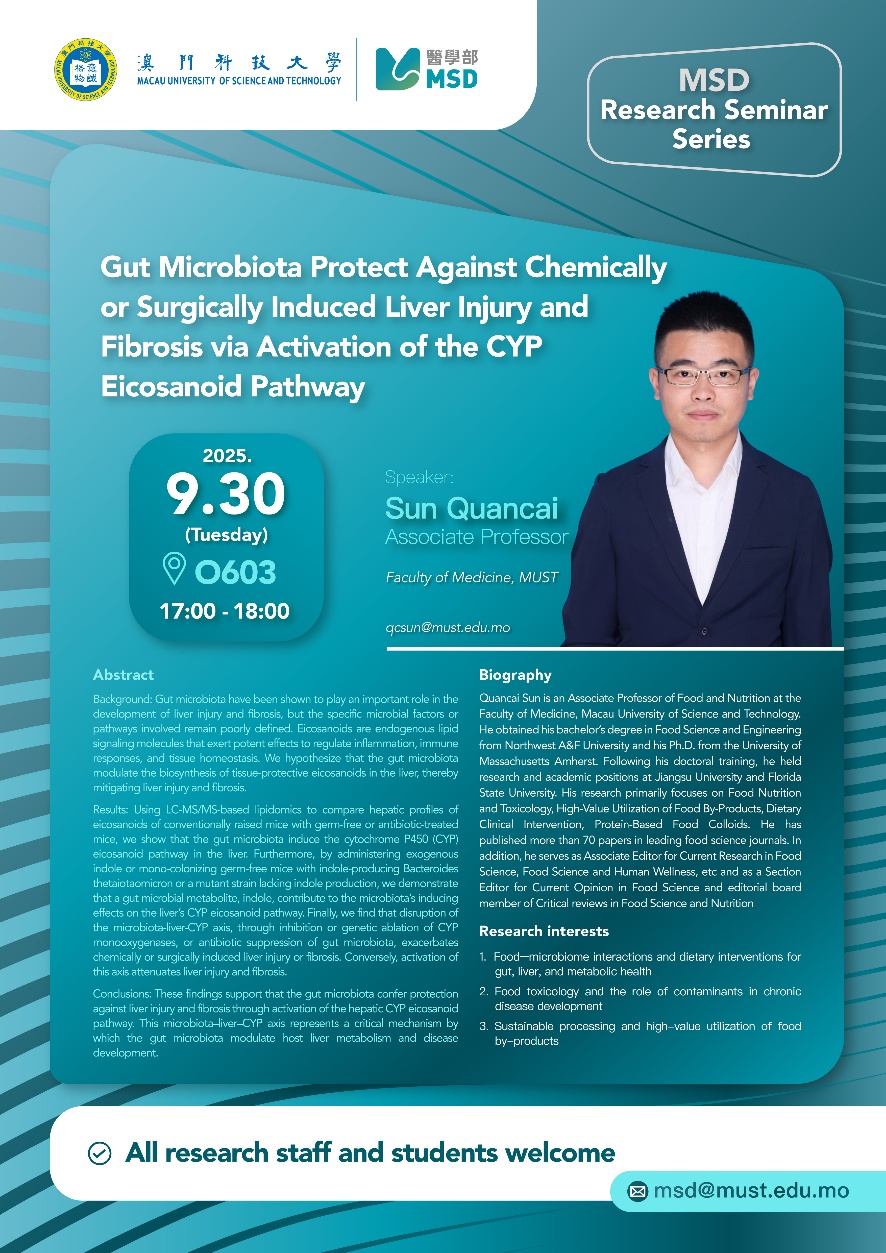Date: 30th September 2025 (Tuesday)
Time: 17:00 -18:00
Venue: O603
Theme: MSD Research Seminar Series- “Gut Microbiota Protect Against Chemically or Surgically Induced Liver Injury and Fibrosis via Activation of the CYP Eicosanoid Pathway”

Speaker’s Biography
Dr. Quancai Sun is an Associate Professor of Food and Nutrition at the Faculty of Medicine, Macau University of Science and Technology. He obtained his bachelor’s degree in Food Science and Engineering from Northwest A&F University and his Ph.D. from the University of Massachusetts Amherst. Following his doctoral training, he held research and academic positions at Jiangsu University and Florida State University. His research primarily focuses on Food Nutrition and Toxicology, High-Value Utilization of Food By-Products, Dietary Clinical Intervention, Protein-Based Food Colloids. He has published more than 70 papers in leading food science journals. In addition, he serves as Associate Editor for Current Research in Food Science, Food Science and Human Wellness, etc and as a Section Editor for Current Opinion in Food Science and editorial board member of Critical reviews in Food Science and Nutrition
Seminar Introduction
Gut microbiota have been shown to play an important role in the development of liver injury and fibrosis, but the specific microbial factors or pathways involved remain poorly defined. Eicosanoids are endogenous lipid signaling molecules that exert potent effects to regulate inflammation, immune responses, and tissue homeostasis. We hypothesize that the gut microbiota modulate the biosynthesis of tissue-protective eicosanoids in the liver, thereby mitigating liver injury and fibrosis.
Using LC-MS/MS-based lipidomics to compare hepatic profiles of eicosanoids of conventionally raised mice with germ-free or antibiotic-treated mice, we show that the gut microbiota induce the cytochrome P450 (CYP) eicosanoid pathway in the liver. Furthermore, by administering exogenous indole or mono-colonizing germ-free mice with indole-producing Bacteroides thetaiotaomicron or a mutant strain lacking indole production, we demonstrate that a gut microbial metabolite, indole, contribute to the microbiota’s inducing effects on the liver’s CYP eicosanoid pathway. Finally, we find that disruption of the microbiota-liver-CYP axis, through inhibition or genetic ablation of CYP monooxygenases, or antibiotic suppression of gut microbiota, exacerbates chemically or surgically induced liver injury or fibrosis. Conversely, activation of this axis attenuates liver injury and fibrosis.
These findings support that the gut microbiota confer protection against liver injury and fibrosis through activation of the hepatic CYP eicosanoid pathway. This microbiota–liver–CYP axis represents a critical mechanism by which the gut microbiota modulate host liver metabolism and disease development.
Students who are interested should register on WeMust - Event.
All research staff and students are welcome to attend this seminar.
For more inquiries, please contact (853) 8897 3411 or email msd@must.edu.mo





